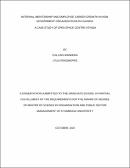Internal mentorship and employee career growth in non-government organizations in Uganda. a case study of open space centre-Ntinda
Abstract
The intent of this study was to determine the contribution of internal mentorship to employee career growth in Non-Government Organization (NGOs) in Uganda using a case study of Open Space Centre. The study objectives were to; determine whether mentorship identification contributes to employee career growth, examine how mentoring programmes contributes to employee career growth, establish the contribution of role modeling to employee career growth at Open Space Centre. The study employed a case study research design and both quantitative and qualitative approaches were adopted. Quantitative data was collected using both questionnaire and interview guide from a sample of 55 respondents and only of 45 respondents working at Open Space Centre were able to participate giving a response rate of 81.81%. Qualitative data was collected using an interview guide from a sample of 11 respondents and only 8 were able interviewed giving a response rate of 72.72%.The study was underpinned of the Social exchange theory, prerequisite tests were carried out were data was tested for normality and multicollinearity, all data was normally distributed and lacked collinearity effects and multiple regression analysis was used to address the study objectives. The study findings revealed mentorship identification does not significantly contribute to employee career growth (β= 0.019, p>0.05), mentorship programmes significantly contribute to employee career growth (β= 0.548, p<0.05), role modeling also significantly contribute to employee career growth (β= 0.355, p<0.05). The study recommends that Mentorship programme should be enhanced through; coaching, informal discussions that are important for sharing ideas and performance feedback so as to help employees achieve their goals and prepare them for senior leadership position. Role modeling should also be enhanced through; offering stretch assignments by managers, line managers and supervisors to employees so as to have expertise that can be useful in a different capacity which allows people to go outside their career comfort zone. Further studies can be conducted on how other dimensions of internal mentorship other than mentorship identification, mentorship programmes and role modeling contribute to employee career growth. A similar study may be conducted in other organizations other than Non-Government Organizations like manufacturing companies, construction companies, higher institutions of learning, financial institutions, corporate companies in Uganda to determine how much internal mentorship contributes to employee career growth.

